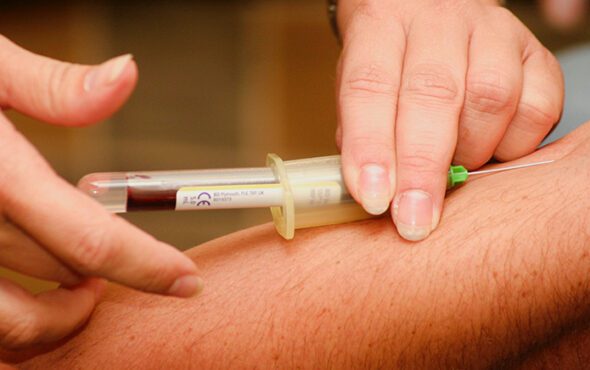
Last year saw record amounts of HIV testing among gay, bisexual and other men who have sex with men (GBMSM) in England, according to the UK Health Security Agency (UKHSA).
Sexual health services recorded 192,503 tests in 2022 alone in this group, up from 156,865 in 2019.
The number of heterosexual adults getting tested for HIV continues to remain below pre-COVID-19 pandemic levels (792,875 in England in 2022 compared with 1,051,391 in 2019).
The number of people taking PrEP, which reduces the risk of getting HIV from sex by about 99 per cent when taken correctly, rose between 2021 and 2022 from 61,510 to 86,324 people, respectively – though the UKHSA noted that there are still disparities in uptake when it comes to sexual orientation.
The data also showed a decrease in the number of GBMSM diagnosed with HIV in England last year, down from 784 in 2021 to 724 in 2022.
READ MORE: HIV diagnoses in heterosexuals overtake those in gay and bi men in Scotland
However, these rates increased in heterosexual adults from 870 in 2021 to 976 in 2022, particularly in women living outside of London and ethnic minority groups.
Overall, there were approximately 3,805 diagnoses in England last year, reflecting an increase of 22 per cent from 3,118 in 2021.
“These latest data show the positive results of our ongoing efforts to end new HIV transmissions within England by 2030”
Professor Kevin Fenton, Chief Advisor on HIV to Government and Chair of the HIV Action Plan Implementation Steering Group, said: “These latest data show the positive results of our ongoing efforts to end new HIV transmissions within England by 2030. Through our HIV Prevention Programme (HPE) and the fantastic work of our local authority and NHS colleagues, we are making positive progress to boost testing uptake and improve timely access to effective treatment.
“However, we’re not yet seeing progress across the board and there remain some concerning trends around low testing and PrEP uptake in certain groups, particularly in women and those from ethnic minority backgrounds.
“As we continue working to reduce HIV transmission it is expected that we will see evidence of inequalities, especially in those populations with access and engagement issues in prevention and treatment services. The report’s findings reinforce the need for targeting and prioritising the most vulnerable communities whilst maintaining robust prevention, treatment and care programmes for all.
“Our priorities for HIV control remain the same and must now be accelerated to respond to the emerging trends: scaling up HIV testing, expanding access to HIV PrEP, linking and maintaining patients in high quality HIV care, and tackling HIV stigma. The latest data will allow our partners to continue working with affected communities, further target resources and prioritise interventions where they are most needed.”
“The progress being made isn’t fast enough nor being felt equally across all of the groups impacted by HIV”
Leading sexual health charity Terrence Higgins Trust said the data, while showing that progress is being made, suggests progress towards the 2030 goal isn’t being made quickly enough or being felt equally across all groups.
Richard Angell, its Chief Executive, praised the “real and demonstrable progress” but noted that the numbers must “serve as a clear warning that urgent action is needed to prevent that historic and pioneering goal from being missed.”
“While there is much to celebrate about the effectiveness of A&E testing and more people accessing effective treatment and care, the progress being made isn’t fast enough nor being felt equally across all of the groups impacted by HIV, he continued. “No one should leave a sexual health clinic without having a HIV test.”
READ MORE: I Kissed a Boy star Dan Harry on joining “groundbreaking” HIV vaccine trial
This sentiment was echoed by Deborah Gold, Chief Executive of the National Aids Trust, who highlighted that sexual health services are still recovering from the COVID-19 pandemic.
She said: “The system is particularly failing women. Far too few women are offered or take up HIV tests, even fewer than before COVID-19. More worrying still, a high proportion of women are diagnosed with HIV late, when it has likely affected their health. And many more women could benefit from the HIV prevention drug PrEP.
“Accessibility of HIV testing and PrEP must be increased, including making them more widely available in other services that women are more likely to access.”



